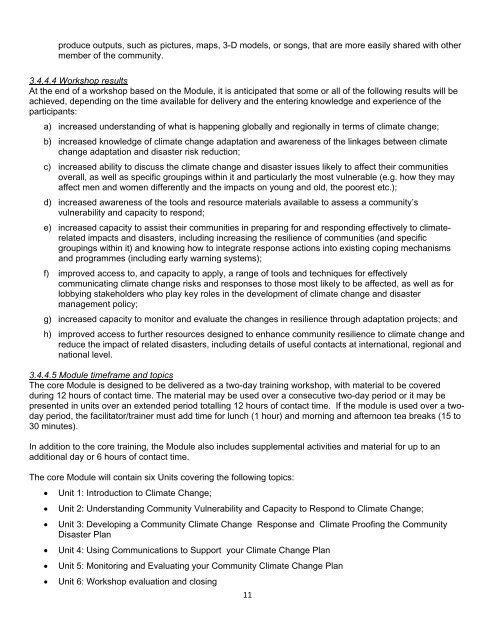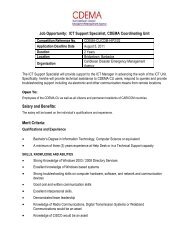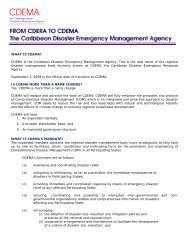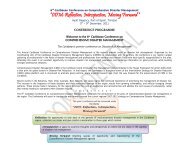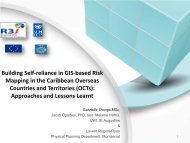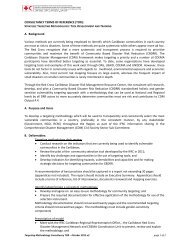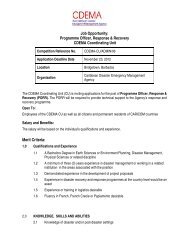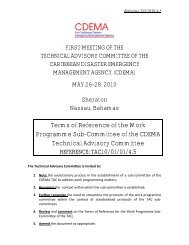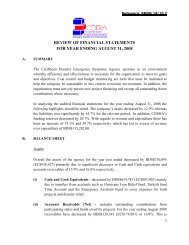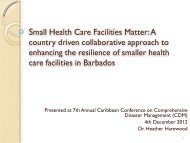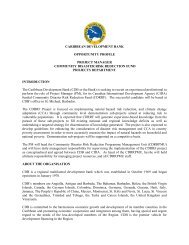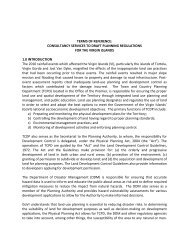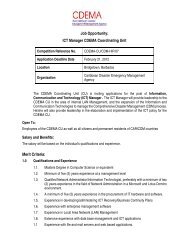You also want an ePaper? Increase the reach of your titles
YUMPU automatically turns print PDFs into web optimized ePapers that Google loves.
produce outputs, such as pictures, maps, 3-D models, or songs, that are more easily shared with other<br />
member of the community.<br />
3.4.4.4 Workshop results<br />
At the end of a workshop based on the Module, it is anticipated that some or all of the following results will be<br />
achieved, depending on the time available for delivery and the entering knowledge and experience of the<br />
participants:<br />
a) increased understanding of what is happening globally and regionally in terms of climate change;<br />
b) increased knowledge of climate change adaptation and awareness of the linkages between climate<br />
change adaptation and disaster risk reduction;<br />
c) increased ability to discuss the climate change and disaster issues likely to affect their communities<br />
overall, as well as specific groupings within it and particularly the most vulnerable (e.g. how they may<br />
affect men and women differently and the impacts on young and old, the poorest etc.);<br />
d) increased awareness of the tools and resource materials available to assess a community’s<br />
vulnerability and capacity to respond;<br />
e) increased capacity to assist their communities in preparing for and responding effectively to climaterelated<br />
impacts and disasters, including increasing the resilience of communities (and specific<br />
groupings within it) and knowing how to integrate response actions into existing coping mechanisms<br />
and programmes (including early warning systems);<br />
f) improved access to, and capacity to apply, a range of tools and techniques for effectively<br />
communicating climate change risks and responses to those most likely to be affected, as well as for<br />
lobbying stakeholders who play key roles in the development of climate change and disaster<br />
management policy;<br />
g) increased capacity to monitor and evaluate the changes in resilience through adaptation projects; and<br />
h) improved access to further resources designed to enhance community resilience to climate change and<br />
reduce the impact of related disasters, including details of useful contacts at international, regional and<br />
national level.<br />
3.4.4.5 Module timeframe and topics<br />
The core Module is designed to be delivered as a two-day training workshop, with material to be covered<br />
during 12 hours of contact time. The material may be used over a consecutive two-day period or it may be<br />
presented in units over an extended period totalling 12 hours of contact time. If the module is used over a twoday<br />
period, the facilitator/trainer must add time for lunch (1 hour) and morning and afternoon tea breaks (15 to<br />
30 minutes).<br />
In addition to the core training, the Module also includes supplemental activities and material for up to an<br />
additional day or 6 hours of contact time.<br />
The core Module will contain six Units covering the following topics:<br />
<br />
<br />
<br />
<br />
<br />
<br />
Unit 1: Introduction to Climate Change;<br />
Unit 2: Understanding Community Vulnerability and Capacity to Respond to Climate Change;<br />
Unit 3: Developing a Community Climate Change Response and Climate Proofing the Community<br />
Disaster Plan<br />
Unit 4: Using Communications to Support your Climate Change Plan<br />
Unit 5: Monitoring and Evaluating your Community Climate Change Plan<br />
Unit 6: Workshop evaluation and closing<br />
11


